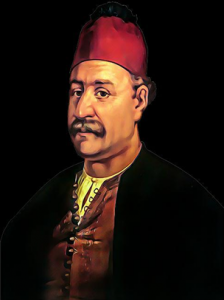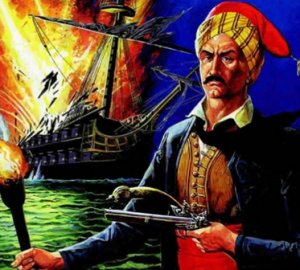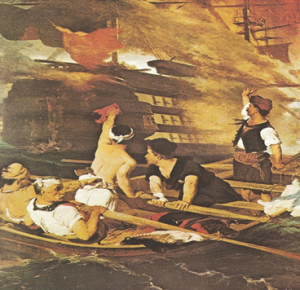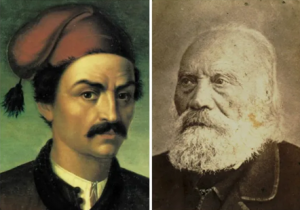
1. Andreas Miaoulis
Andreas Miaoulis was born on May 20, 1769, in Hydra. His family was rich since his father Dimitrios was already a shipowner.
He quickly learned the secrets of the sea and indulged in piracy. He knew the dangers of the sea and the tactics he should follow during a naval battle.
Miaoulis was one of the people who believed that the Greeks were not yet prepared for a national uprising against the Ottomans, but when the Revolution broke out he was one of the first to throw himself into the fire of the Struggle.
On March 28, 1821, he offered in favor of independence a significant sum of money to cover the first needs and a little later his own ships. But above all, he put himself at the disposal of the country.
Miaoulis died in the afternoon of June 11, 1835 due to the tuberculosis that afflicted him. By order of King Otto and according to a custom of the time, his heart was removed, embalmed and placed in a special silver box which was kept in the temple of the Dormition in Hydra and today it is in the museum of the picturesque island.
ΓΙΑΝΝΗΣ ΤΟΥΛΙΟΠΟΥΛΟΣ
2. Konstantinos Kanaris
Konstantinos Kanaris was born around 1790 in a little island near Chios, named Psara. He was a politician and an admiral. He took part in the Greek war of independence against the Ottomans. He was a sailor like most of his family members.
His father died when Kanaris was young. After his father’s death Kanaris worked for his uncle on his boat and learned everything about sea. When his uncle died he became captain of his boat. He married Despina Maniati and they had seven children. He wasn’t a member of Filiki Etairia, despite the fact that he was one of the first men that took part in the fight against the Ottomans.
When the Revolution began, Kanaris left the merchant navy, where he was a captain, and took part in raids against the Turks. In June 1822, he approachednwith his fireboat the port of destroyed Chios and blew up the flagship of the Turkish fleet, in which admiral Kara Ali was killed with about 2,000 Ottoman sailors and soldiers celebrating Bajrami, the largest religious holiday of Muslims. It was the revenge of the Greeks for the destruction of Chios a few months earlier.
In October of the same year, Kanaris set fire to the vice-admiralty of the new Turkish admiral in Tenedos, resulting in the Ottoman fleet being locked up at its headquarters in Dardanelia. In 1824, Kanaris destroyed two more Turkish warships in Samos and Mytilene, while in 1826 he was wounded in an attack on a Turkish frigate and was in danger of being captured.
Kanaris had proposed, in August 1825, that the Greeks set fire to the Egyptian fleet inside its base in the port of Alexandria. According to his plan, three fireships and two warships headed for Egypt and approached Alexandria. He was the only one who entered the port with his gunboat, but was forced to set fire to it prematurely, as the favorable wind had abated and the operation had been noticed by a French warship, which began to gun them.
After the Liberation, Kanaris was appointed commander-in-chief of the fleet of fireboats. He later became an admiral, reaching the post of prime minister. The Greek state, in order to honor him, gave his name to three warships. He died on 2nd September 1877 at the age of 87.
ΜΑΡΚΟΥ ΕΛΕΝΗ
3. Kyriakos «Kitsos» Tzavelas
 Kitsos” Tzavelas was a Souliot fighter in the Greek War of Independence and later a Hellenic Army General and Prime Minister of Greece.
Kitsos” Tzavelas was a Souliot fighter in the Greek War of Independence and later a Hellenic Army General and Prime Minister of Greece.
Early years and Greek War of Independence
He grew up in exile in Kerkyra. Upon his return to mainland Greece in 1822, he became the head of his family. He was initially under the patronage of Georgios Karaiskakis at the beginning of the Greek War of Indepedence. When Ibrahim Pasha invaded the Peloponnese in 1825, Tzavellas, together with Kitsos Botsaris and Georgios Karaiskakis were among the Greek leaders to advance in Messenia and succeeded to relieve the siege of Navarino. In his speech to the Third National Council of the provisional Greek government in 1826, Tzavelas stressed the sacrifice of the Souliotes for a common fatherland. In 1827, Tzavelas had campaigned successfully in central Rumeli, and would eventually recapture Karpenisi in December.
Post-Independence
After Independence, Tzavelas became a supporter of Kapodistrias and a leader in the Russian Party. Accused of planning a revolt against the king in 1834, Tzavelas was imprisoned. When King Otto came of age and took over the reins of government, Tzavelas was released and later was named aide-de-camp to the king.
He was subsequently appointed Minister of War in 1844 and, in 1847-1848, Prime Minister. In 1854, during the Crimean War, a number of Greek military officers of Souliot descent, under Kitsos Tzavelas, participated in a failed revolt in Epirus, demanding union with Greece.
Kitsos Tzavelas died in Athens on 21 March 1855, leaving behind his wife Vasiliki Tzavela.
ΓΙΑΝΝΗΣ ΚΡΙΑΡΑΚΗΣ








Ευχαριστούμε πολύ τον Γιάννη Τουλιόπουλο, την Έλενα Μάρκου και τον Γιάννη Κριαράκη που παραχώρησαν στο περιοδικό μας τις εργασίες τους στο πλαίσιου του μαθήματος των Αγγλικών της κας Έφης Σαμαρά. Έφη, όπως και περυσι έτσι και φέτος, σε συγχαίρουμε για τον συνδυασμό αγγλικής γλώσσας και ελληνικής ιστορίας που είχε ως αποτέλεσμα πολλές και υπέροχες εργασίες για του ήρωες της Ελληνικής Επανάστασης του 1821 από τους/τις μαθητές/ήτριές σου!